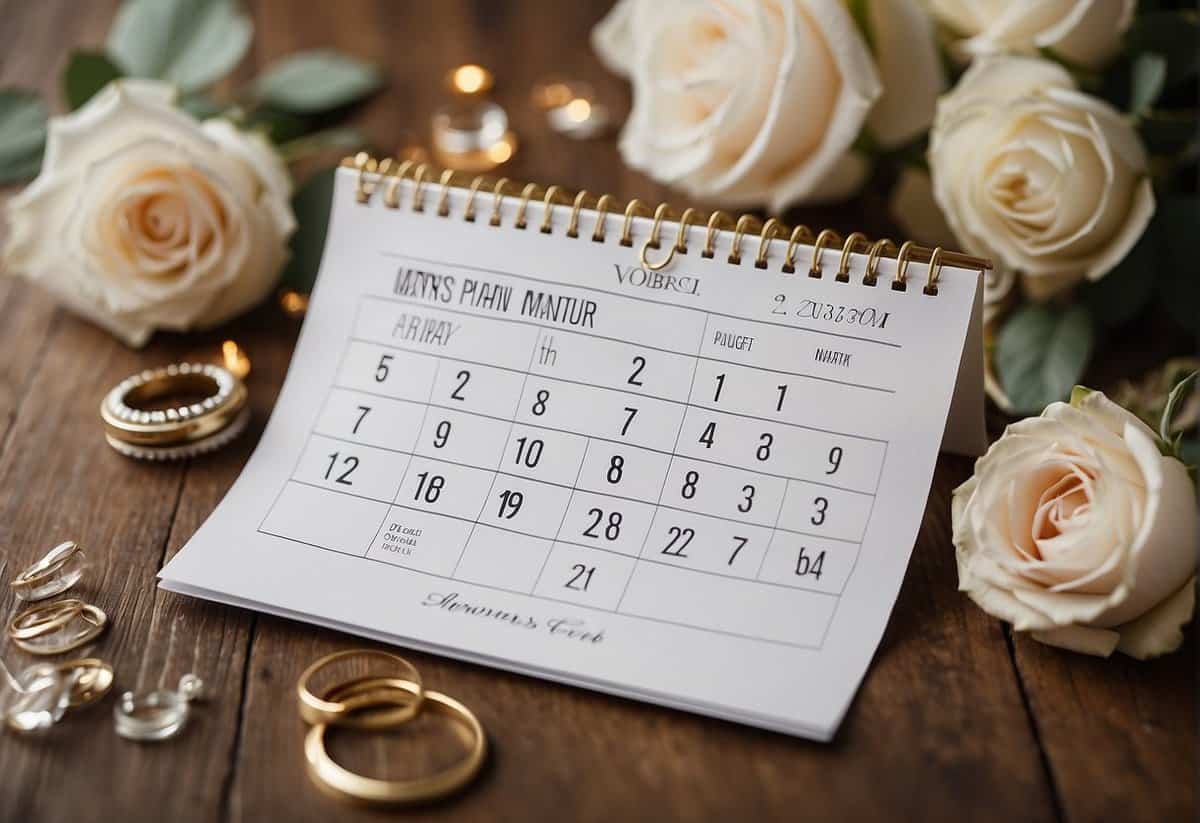Is 7 Months Long Enough to Plan a Wedding? Quick Tips for Timely Nuptials
Deciding whether 7 months is a sufficient amount of time to plan a wedding can be quite challenging. While traditionally, couples may engage in a longer planning period, such as a year or more, modern weddings have proved to be quite flexible. If you’ve recently got engaged and are considering a shorter timeframe, understanding the essential elements and prioritizing tasks will be key to your success.

With a condensed timeline, you’ll need to start organizing your plans right away. This includes establishing your vision for the big day and creating a clear and workable budget. Keeping on track with a well-structured timeline and checklists will ensure that nothing important gets overlooked, and you can seamlessly move from one phase of preparation to the next. The selection of vendors and venues becomes more critical as you may face more competition for dates, so prompt decision-making is paramount. While planning a wedding in a shorter timeframe is certainly doable, efficiency in finalizing details will be your most important strategy.
Key Takeaways
- Prioritize tasks and make decisions quickly to plan successfully within 7 months.
- Checklists and a structured timeline are crucial for staying organized.
- Prompt selection of vendors and venues is necessary due to tighter schedules.
Establishing Your Wedding Vision and Budget
In the journey to your big day, defining your wedding vision and how much you’re willing to spend are essential first steps. They will lay the groundwork for all the decisions to come in the wedding planning process.

Creating a Vision for Your Big Day
Imagine what you want your wedding to reflect about you as a couple—this will be your wedding vision. Is it a garden-party atmosphere or a grand ballroom event? Highlight specific elements you both love, like live music or sustainable practices. Jot them down as your guiding stars. These preferences will play a significant role in aligning your choices throughout the wedding planning process.
Setting a Realistic Wedding Budget
Before you dive into booking venues and vendors, determine what you can afford. Start by looking at your finances and deciding how much you can save up each month leading up to your big day. Consider tools like the budget planner from Zola to help allocate funds to different parts of your wedding. Allocate a larger portion of your wedding budget to your top priorities, whether that’s food, music, or photography, and look for ways to reduce costs on less important aspects. Remember, be realistic—your wedding budget will shape your choices and help you plan responsibly.
The Wedding Planning Timeline and Checklists

Successfully mapping out your wedding within a seven-month timeframe hinges on creating a thorough planning timeline and adhering to a detailed checklist. This structured approach can alleviate pressure and keep your journey toward the big day organized and enjoyable.
Drafting a Planning Timeline
To make the most of your engagement period, begin drafting a planning timeline as early as you possibly can. The key is to prioritize bookings that typically require more notice, such as venues and vendors. For instance, within the first month, you should:
- Determine a budget
- Choose a date and book a venue
- Start compiling your guest list
Checklist for Key Milestones
Starting planning early can make your seven-month lead-up feel far less rushed. Here’s a checklist of the key milestones you should aim for to stay on track:
- 2 Months Out:
- Finalize your guest list
- Send out wedding invitations
- 4 Months Out:
- Book a caterer, photographer, and entertainment
- 6 Months Out:
- Purchase wedding attire
- Reserve hotel blocks for out-of-town guests
Using these timelines and checklists should help you manage the expectations and deadlines leading up to your wedding day. Remember, while planning, the resources like The Ultimate Wedding-Planning Checklist and Timeline – Brides and How to Plan a Wedding in 6 Months can offer additional guidance and support.
Selecting Vendors and Venues

When planning your wedding within a 7-month timeframe, securing your venue and vendors early is crucial as they are pivotal to setting your wedding date and location. Your choices here establish the foundation for the rest of your wedding plans.
Booking the Perfect Venue
Your wedding venue is often the linchpin of your celebration. Starting immediately is critical, as prime locations get snapped up quickly. Consider the following to streamline your venue selection process:
- Availability: Check if your desired wedding date aligns with venue availability.
- Capacity: Make sure the venue accommodates your guest list size.
- Location: Evaluate the convenience and attractiveness of the location.
- Services: Some venues offer in-house catering and furniture. Inquire if you need to book these vendors separately.
Choosing the Right Vendors
Once your venue is booked, you’ll want to focus on pinpointing the right vendors. These professionals are essential in bringing your wedding vision to life, so it’s important to prioritize based on their roles:
- Priority Vendors: Your photographer, florist, and caterer should be among your first considerations.
- Photographer: They capture the moments you’ll cherish for a lifetime, so view portfolios and read reviews to find the best fit for your style.
- Florist: An experienced florist can make your venue bloom with beauty within your budget.
- Caterer: They are responsible for one of the most memorable aspects of your reception — the food.
- Engagement Length: Be aware that shorter engagements may mean more flexibility and decisiveness is needed when choosing vendors.
By addressing these key points promptly, you’ll ensure that the pivotal aspects of your wedding—the venue and vendors—are set, allowing you to proceed confidently with the other details of your big day.
Finalizing Details for Your Big Day

As you edge closer to your big day, tying up loose ends is crucial for a smooth experience. It’s important to focus on the essentials: ensuring your guests are informed and your wedding party looks and feels fabulous.
Sending Invitations and Managing the Guest List
Begin by sending out your invitations with enough lead time for your guests to RSVP. Aim to have these pieces of important correspondence in the mail about 6-8 weeks before the wedding to provide ample response time. This is also a good opportunity to double-check your guest list for any last-minute additions or updates. Effective management of your guest list now can prevent potential headaches as the countdown to the wedding day continues.
Attire, Trials, and Day-Of Coordination
Your wedding attire, from the wedding dress to the wedding rings, should be on your final checklist. Scheduling final fittings for you and your bridal party is important to ensure everyone looks their best. Moreover, now is the time to complete hair and makeup trials to finalize your look for the day. Also, touch base with your day-of coordinator to review the timeline and logistics. This step is crucial to ensure your wedding party knows where they need to be and when. Confirm details such as transportation, schedules for the ceremony and reception, and any specific responsibilities assigned to the wedding party members.
Frequently Asked Questions

When you’re planning a wedding in under a year, staying organized and prioritizing are key. Here’s how you can navigate the accelerated timeline without sacrificing your dream day.
What are the essential steps for planning a wedding in under a year?
Begin by securing your venue and setting a date, then immediately book your main vendors. Prioritize tasks by month, with venue and vendor selection in the early stages and details like decor and attire closer to the six-month mark.
What checklist should I follow if I have a 6-month wedding planning timeline?
Start with a wedding planning checklist tailored for shorter engagements. Critical tasks include booking your venue, hiring vendors, sending invites, and choosing attire within the first couple of months.
How can I plan a budget-friendly wedding in less than 8 months?
Focus on defining your budget early and be clear about it when working with vendors. Opt for a less popular wedding date or consider package deals from venues to save money.
What should be my major priorities when planning a wedding with a 7-month timeframe?
Your priorities should include booking the venue, securing key vendors, finalizing the guest list, and sending out save-the-dates. With a 7-month timeline, agility in decision-making will be crucial.
Can I book all my wedding vendors with only 6 months to go?
While challenging, it’s possible—especially if you’re flexible with your dates and choices. It’s best to book your vendors quickly, starting with the most in-demand ones like photographers and caterers.
What beauty and self-care plan should I follow leading up to a wedding in 6 months?
Start a beauty regimen early, focusing on skin care and healthy habits. Schedule trials for hair and makeup to ensure you have the look you want, and book these professionals at least a few months in advance.

